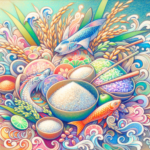The Allure of Japanese Food Culture: A Flavorful Journey
Japanese food culture is not just about cuisine; it’s a rich tapestry woven with flavor, spirituality, and a deep respect for nature. This text explores the fascinating aspects of Japanese culinary traditions, emphasizing the beauty and balance inherent in each dish.
Many people can relate to the overwhelming sea of food options available today, often feeling disconnected from their roots and traditions. This sense of nostalgia can spark curiosity about the culinary practices that shaped modern Japan. Understanding these roots not only fosters appreciation but also encourages mindful eating and living.
In a world increasingly dominated by fast food and convenience, exploring Japanese food culture reveals the potential for a more meaningful and healthier approach to eating. The principles of balance and appreciation found in Japanese cuisine offer a blueprint for those seeking not just sustenance, but a connection with their meals and the environment that sustains them.
After delving into the depths of this text, readers are invited to take a step towards exploring or embracing Japanese food culture in their own lives. Whether it’s trying new recipes, visiting a local sushi restaurant, or simply adopting the philosophy of mindful eating, embracing these practices can lead to a richer, more fulfilling dining experience.
Origins and Characteristics of Japanese Food Culture
Japanese food culture has been evolving for over a thousand years, shaped by influences from neighboring countries like China and Korea, as well as from distant lands such as Portugal and the Netherlands. One standout characteristic of Japanese cuisine is its commitment to using fresh ingredients, expressing seasonal flavors, and creating visually stunning presentations.
At the heart of this culture lies a profound relationship with nature. The Japanese have long cherished the bounty of the earth and the sea, embodying gratitude in their eating habits. Dishes heavy in vegetables, fish, and grains not only enhance health but also maintain balance, positively impacting both the body and mind.
Moreover, the focus on beautiful plating and colorful presentations elevates the dining experience. Japanese food is not merely about nourishment; it is an art form that pleases the eyes as well as the palate. Each meal is a harmonious composition, blending colors, shapes, and the design of dishware into an artistic experience.
The Spirituality of Washoku (Japanese Cuisine)
Washoku, the epitome of Japanese food culture, embodies a spiritual essence that is crucial to understanding its depth. Phrases like “itadakimasu” (I humbly receive) and “gochisousama” (thank you for the meal) symbolize a heartfelt gratitude for food and the natural world, serving as reminders of respect towards all that contributes to our sustenance.
In washoku, the emphasis on the changing seasons is apparent. Spring delights with cherry blossoms, summer’s bounty is reflected in lush greens, autumn showcases vibrant reds and yellows, while winter warms with comforting stews. This seasonal awareness aids in deepening one’s connection not only to food but also to the world around us.
The ichiju-sansai style—consisting of one soup and three side dishes—exemplifies the idiosyncratic balance of meals. This method ensures nutritional completeness while providing an aesthetic feast for the senses, promoting a holistic nourishment that feeds not only the stomach, but also the spirit.
Communication Through Meals
Japanese food culture places great importance on mealtime communication. Celebrating meals with family, friends, or colleagues transforms dining into an essential space for building connections. Sharing food fosters bonds, cultivating trust and intimacy among individuals.
The renowned spirit of omotenashi (hospitality) is integral to Japanese culture. Welcoming guests involves thoughtful meal preparation and setting a warm atmosphere, emphasizing that the act of eating together nurtures relationships. Engaging in home-cooked meals deepens appreciation for one another’s backgrounds, customs, and values.
Dining together transcends mere nutrition; it is an essential medium for engaging hearts and minds. It is a cultural practice that spans generations and regional specialties, ensuring that traditions endure and evolve.
Health and Lifestyle through Food
The influence of Japanese food culture on health is profound. Traditionally, washoku is low in calories while being rich in nutrients. The incorporation of fish, tofu, and an array of vegetables creates a foundation for a healthy lifestyle. Such ingredients are abundant in vitamins and minerals, contributing to overall wellness and disease prevention.
Japanese fermentation techniques have birthed staples like miso and natto, known for their gut health benefits. As the world becomes more health-conscious, these time-honored food practices garner global attention for their remarkable contributions to health and well-being.
Furthermore, the Japanese way of life reflects a harmonious relationship with nature. The philosophy of “locally sourced” (地産地消, chisanshisou) emphasizes utilizing local ingredients, thereby promoting environmental sustainability and community revitalization. This approach fosters a sustainable lifestyle that will benefit future generations while preserving culinary heritage.
Conclusion: The Value of Japanese Food Culture
The allure of Japanese food culture lies not only in its deliciousness but also in the spirituality, communication, and health it promotes. The exquisite presentation of seasonal ingredients delights the senses, while communal dining experiences strengthen relationships. The mindful selection of nourishing foods and living in harmony with nature represent the charm of Japanese culinary traditions.
By delving into and appreciating Japanese food culture, individuals can enrich their daily lives. The continued endeavor to transmit the essence of this culture to future generations is vital in preserving its legacy. The wisdom and warmth embedded in Japanese food culture emphasize that it is indeed a treasure trove, essential for leading a fulfilling and connected life.


